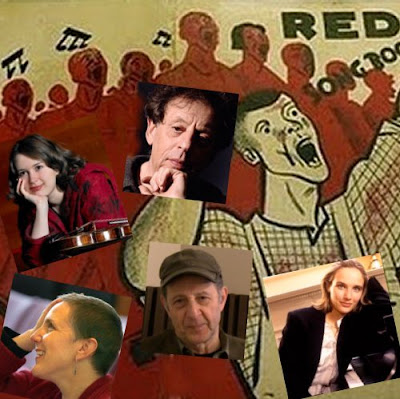Boulez greeted him by turning his back
When, in 1951, Henri Dutilleux presented his vibrantly diatonic First Symphony, Boulez greeted him by turning his back.That is Alex Ross writing in The Rest is Noise and Dutilleux's vibrantly diatonic Symphony is one of the works in a new five CD overview of his music. There is much notable music in the oeuvre of this underrated composer, and also a sub-text that is relevant to the challenges currently facing classical music. Dutilleux (b. 1916) reflects his fascination with time and memory in his compositions, and uses involuntary memory to link past, present and future. His music is certainly not retrogressive. But its message is that, despite Boulez, we cannot turn our backs on the past; a very relevant sentiment as classical music struggles with denying the past and reinventing itself as a child of the digital age.
Virgin Classics' Dutilleux box also includes his Second Symphony, the Cello Concerto composed for Mstislav Rostropovich, the Violin Concerto commissioned by Isaac Stern, and a stunning performance by the Belcea Quartet of Ainsi la Nuit - the latter work obviates back turning as its influences include Webern's Six Bagatelles and Berg’s Lyric Suite, as well as Gregorian chant. I paid just £18.99 for the set at classical independent Prelude Records; yes, it is cheaper elsewhere but I am happy to spend my money in a store where al-Kindī-style good vibrations mean music buying is still a pleasure. Dutilleux is one of several French composers who are worth a detour: others include André Jolivet, who was a friend of Dutilleux, and Maurice Ohama.
Henri Dutilleux died on May 22, 2013. This post is reblogged from August 2012.
Also on Facebook and Twitter. Any copyrighted material on these pages is included as "fair use", for the purpose of study, review or critical analysis only, and will be removed at the request of copyright owner(s). Report broken links, missing images and errors to - overgrownpath at hotmail dot co dot uk









Comments
Had Schoenberg lived a decade longer, he would have been horrified by this. What he might have said stretches the imagination. He, of course, taught that intense study of the past masters should be the first task of the neophyte. His Fundamentals of Musical Composition (the most mis-named book in the history of publishing, I think) is replete with exemplars from Bach, Haydn, Mozart, Mendelssohn, Brahms, et al.
An open letter to Schoenberg from Rene Leibowitz, late 40s I think, is frankly idolatrous, and I think in his masterly conducting he was true to his master. The astounding set of Beethoven's symphonies recorded for Readers Digest by RCA in the early 60s show a conductor exploring music anew and coming out of that process with an approach to Beethoven not to be heard again until the 1980s. Those recordings are available on Chesky, and it is a true shame Leibowitz never received the credit for what he achieved.
Boulez, I do believe, only turned to conducting because he needed the money, which shows how fast even the most violent principles can be cast aside when more basic needs call. I heard him conducting Ravel's Pavane pour une Infante Defunte yesterday, and in the usual fashion, reminding me of Ravel's comment: "I wrote a pavane for a dead princess, not a dead pavane for a princess." Boulez might have re-thought the work, but why should we suppose he gives a damn about what he conducts.
Indeed, given that Schoenberg and Webern wrote tonal compositions and arrangments, can Boulez and Nono have any regard for them? Leibowtiz, who studied with Webern and was damned by his pupil Boulez, was I think the best-known of the products of the Second Viennese School who was wholly true to it and, like my own master, also a pupil of Webern, never thought it necessary to turn his back on the past out of which Schoenberg's system came. It is he who should be studied more closely and far better known.